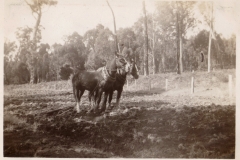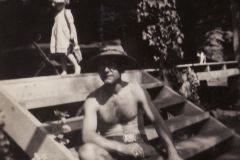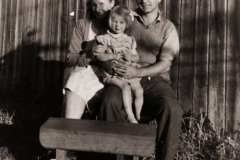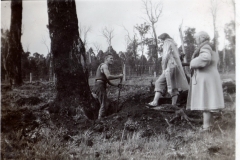The unknown always seems sublime.
Crossing the equator on board the SS Mooltan on the 14th January 1949 I was initiated as a Daughter of Neptune and given the freedom of the seas. All kippers, haddocks and other denizens of the deep were charged not to molest me in any way should I fall overboard.

Coping with an active two year old on board a rolling ship was not Mary’s idea of fun. The pokey little cabins were in the bowels of the ship and men were segregated from women. No sooner would she would reach the cabin after struggling down steep staircases when I would cry: ‘Mam need the lavvy’, and she had to trudge back to the bathrooms, which were at the other end of the ship. Unlike my father, Mary did not suffer from seasickness. An added blessing on the ship was the food. There were none of the dreary rations that they had been used to since even before the war. Food was good and plentiful, probably for the first time in my parent’s lives.

The ship stopped at Aden. In the crowd and confusion of the dusty souks, I became lost. Both my parents were panic-stricken until I was eventually found safe and sound, surrounded by Arabs exclaiming over my blindingly, blonde hair, which apparently signified good luck.
During the voyage, I contracted chicken pox. This became a mixed blessing for my parents who were moved to the sick bay to be near me. The sickbay facilities were more comfortable with a toilet and bathroom, and the couple was together. The next stop was Colombo. We were confined to the ship because of my chicken pox. Another couple from Glasgow were also staying on board.
‘What’s the use?’ they said. ‘We’ve no’ got a penny between us.’
It was agreed they should look after me while John and Mary escaped for a day, and in return were paid enough to allow them to also see a little of Colombo.
.
I often wonder how my parents felt on this journey, which took six long weeks to go half way around the world. On the voyage Mary had plenty of time to dream about what life would be like in Australia. Did she imagine the farm they were going to would be like those in Scotland with rich green pastures and undulating hills? It had been her idea to migrate. During the Second World War, Mum’s youngest sister, Helen had met an airman of the Royal Australian Airforce. Doug was handsome in his uniform with his low sexy voice and his dark skin. Helen begged and borrowed clothes from her friends including one who had several fur coats, in order to look glamorous for this young airman. It was not long until the casual Australian expected to visit her home. Mary remembers Helen rushing into their two-roomed tenement house (a room and a kitchen as opposed to a single end). She picked up dishes, tablecloth and all, and dumped them into the scullery, frantically trying to make the mean little dwelling more presentable. Doug took her to the officer’s mess and fed her small black and white images of wide-open spaces and beautiful beaches that made her hunger for distant shores.

Helen was only eighteen when she shocked her family by migrating to Australia. She landed in Fremantle and was quickly employed by a law firm as a compositor. Mary believed she did not intend to marry, that she wanted to see the world, that in her letters home she hid the fact that she was lonely and homesick and instead talked about Perth in glowing terms. Doug travelled to Perth from South Australia to court Helen, a wide-eyed and beautiful young woman. She supposedly now succumbed to his charms but I suspected this had already happened back in Scotland. And thus sealed her fate as the hard-working wife of a battling dairy farmer in Manjimup, a small timber town, two hundred miles (almost 300 kms) south of Perth. It was a world apart from Glasgow in every way.
Doug had come from a wheat and sheep farm in South Australia. Besides wanting to be independent, I’m not sure what made him start dairy farming in Manjimup, but the heavily timbered land would have been cheap. They bought a farm that had belonged to the Ralstons, pioneers of the district. There was an old house as well as many sheds and a barn. Years of backbreaking work would be needed to make it into a viable dairy farm, but the couple was young and full of energy.
And how did John feel as he and Mary journeyed towards a farm twelve thousand miles from their city home? I know my father was happy in Scotland. His needs were never great. He had friends that were dear to him, and it was a short ferry ride to his beloved Ireland. And he had his music. At a Ceilidh and other gatherings, he and his accordion were popular. And when he hiked in the highlands or roamed around Ireland on his frequent bicycle trips he would have taken his mouth organ. To this day emotion wells up when I hear either of those instruments. The strength of John’s feelings for Ireland was palpable as he described its great beauty, from the green hills of Antrim in the north, with its insanely scenic coastline, to the mystical Ring o’ Kerry in the south. He talked fondly of his family in Bushmills who were carpenters and wheelwrights in the same small village for generations where they had made everything from the altar at the church to coffins and coaches. He was a gentle, quiet man who once told his best friend that what he most wanted from marriage was security. Yet here he was crossing the equator and stepping into the unknown to try to satisfy the woman he had married. John’s needs were few and simple, but there was nothing simple about Mary.



